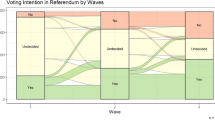Abstract
Voting Advice Applications (VAAs) have been established all over Europe, some of which used by millions of voters to decide which party to vote for. Our study establishes a new database of national VAAs for the European Parliament election in 2019 and opens up new possibilities how to use this data: The article surveys and evaluates the different thematic focuses of these online instruments. With our data set, we can show the different national issues and the differing degrees of the Europeanization in the national EU election campaigns.
Access this chapter
Tax calculation will be finalised at checkout
Purchases are for personal use only
Similar content being viewed by others
Notes
- 1.
We were able to include 23 VAAs from 22 countries in our study, but we do not include pan-european VAAs such as euandi.
- 2.
We acknowledge that there might be a gap between the actors formulating the VAAs (academia etc.) and the possible consumers of the VAAs with regard to the perceived importance of European issues in relation to national issues.
- 3.
An international comparative study by Van Camp et al. (2014) looks at various VAAs of national elections from 2002–2012, other attempts of research in this direction have not been finalized.
References
Abels, G., & Wilde, G. (2016). Legitimationsprobleme europäischer Staatlichkeit. Parlamentarismus und Zivilgesellschaft als Strategien für eine politische Öffentlichkeit. In H.-J. Bieling & M. Große Hüttmann (Hrsg.), Europäische Staatlichkeit. Staat – Souveränität – Nation (S. 259–280). Wiesbaden: Springer VS.
Abromeit, H. (1998). Democracy in Europe. Legitimising politics in a non-state polity. Oxford: Berghahn.
Braun, D., Hutter, S., & Kerscher, A. (2016). What type of Europe? The salience of polity and policy issues in European parliament elections. European Union Politics, 17(4), 570–592.
Cedroni, L., & Garzia, D. (Hrsg.). (2010). Voting advice applications in Europe: The state of the art. Naples: ScriptaWeb.
Crum, B., & Fossum, J. E. (2009). The multilevel parliamentary field: A framework for theorizing representative democracy in the EU. European Political Science Review, 1, 249–271.
ECPR Research Network on VAA. (2019). VAA Data. http://vaa-research.net/?page_id=146. Accessed: 10. Sept. 2019.
Fossen, T., & Anderson, J. (2014). What’s the point of voting advice applications? Competing perspectives on democracy and citizenship. Electoral Studies, 36, 244–251.
Garzia, D., & Marschall, S. (Hrsg.). (2014). Matching voters with parties and candidates. Voting advice applications in comparative perspective. Colchester: ECPR Press.
Golder, S. N., Lago, I., Blais, A., Gidengil, E., & Gschwend, T. (2017). Multi-level electoral politics. Beyond the second-order election model. Oxford: Oxford University Press.
Heinsohn, T., Israel, J., Marschall, S., & Schultze, M. (2016). Online-Wahlhilfen in Wahlkämpfen. Empirische Ergebnisse einer Panelbefragung zur Europawahl 2014. Zeitschrift für Politikwissenschaft, 26(3), 253–277.
Höller, I. (2015). Haupt- und Nebenwahlkämpfe? Mediale Berichterstattung und politische PR in österreichischen Wahlkämpfen. Berlin: LIT.
Holtz-Bacha, C. (Hrsg.). (2005). Europawahl 2004. Die Massenmedien im Europawahlkampf. Wiesbaden: Springer VS.
Koopmans, R., & Erbe, J. (2004). Towards a European public sphere? Vertical and horizontal dimensions of Europeanized political communication. Innovation. The European Journal of Social Science Research, 17(2), 97–118.
Kriesi, H., & Grande, E. (2015). The europeanization of the national political debate. In O. Cramme & S. Binzer Hobolt (Hrsg.), Democratic politics in a European union under stress (S. 67–86). Oxford: Oxford University Press.
Marsh, M. (1998). Testing the second-order election model after four European elections. British Journal of Political Science, 28, 591–607.
Peters, B., Sifft, S., Wimmel, A., Brüggemann, M., & Kleinen-Von Königslöw, K. (2005). 7 National and transnational public spheres: The case of the EU. European Review, 13(1), 139–160.
Reif, K., & Schmitt, H. (1980). Nine second-order national elections. A conceptual framework for the analysis of European election results. European Journal of Political Research, 8(1), 3–44.
Risse, T. (2015). European public spheres: Politics is back. Cambridge: Cambridge University Press.
Rittberger, B. (2005). Building Europe’s parliament: Democratic representation beyond the nation state. Oxford: Oxford University Press.
Sanders, D., Bellucci, P., Tóka, G., & Torcal, M. (2012). The Europeanization of national polities? Citizenship and support in a post-enlargement union. Oxford: Oxford University Press.
Schakel, A. (2015). How to analyze second-order election effects? A refined second-order election model. Comparative European Politics, 13(6), 636–655.
Träger, H., & Anders, L. (2020). Europawahl 2019 als “second order election”? In M. Kaeding, M. Müller, & J. Schmälter (Eds.), Die Europawahl 2019. Wiesbaden: Springer VS.
Van Camp, K., Lefevere, J., & Walgrave, S. (2014). The content and formulation of statements in voting advice applications: A comparative analysis of 26 VAAs. In D. Garzia & S. Marschall (Eds.), Matching voters with parties and candidates. Voting advice applications in comparative perspective (pp. 11–31). Colchester: ECPR Press.
Wallaschek, S. (2020). Transnational media—transnational actors and issues? How transnational media outlets report about the European Parliament election. In M. Kaeding, M. Müller, & J. Schmälter (Eds.), Die Europawahl 2019. Wiesbaden: Springer VS.
Author information
Authors and Affiliations
Corresponding author
Editor information
Editors and Affiliations
Rights and permissions
Copyright information
© 2020 Springer Fachmedien Wiesbaden GmbH, ein Teil von Springer Nature
About this chapter
Cite this chapter
Christiansmeyer, G., Kaufer, R. (2020). Clicking and Voting: Agendas of Voting Advice Applications (VAA) for the European Elections 2019. In: Kaeding, M., Müller, M., Schmälter, J. (eds) Die Europawahl 2019. Springer VS, Wiesbaden. https://doi.org/10.1007/978-3-658-29277-5_21
Download citation
DOI: https://doi.org/10.1007/978-3-658-29277-5_21
Published:
Publisher Name: Springer VS, Wiesbaden
Print ISBN: 978-3-658-29276-8
Online ISBN: 978-3-658-29277-5
eBook Packages: Social Science and Law (German Language)




